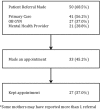Follow-up of Mothers with Suspected Postpartum Depression from Pediatrics Clinics
- PMID: 29043246
- PMCID: PMC5632353
- DOI: 10.3389/fped.2017.00212
Follow-up of Mothers with Suspected Postpartum Depression from Pediatrics Clinics
Abstract
Purpose: Pediatric providers are increasingly screening for postpartum depression (PD), yet, it is unknown how often mothers comply with recommendations to seek treatment. The objectives were to describe the rate at which mothers with suspected PD seek treatment and explore factors that predict help-seeking behavior.
Design and methods: Mothers were recruited from four pediatric clinics after identification using the Child Health Improvement through Computer Automation (CHICA) system. Mothers with a positive screen were invited to participate in a telephone interview between January 2012 and December 2014. Mothers reported if they sought treatment or called a community resource.
Results: 73 of 133 eligible mothers participated (55% response rate). Fifty women recalled a recommendation to seek help. Only 43.8% (32/73) made a follow-up appointment with an adult provider and even fewer kept the appointment.
Conclusion: A majority of mothers suspected of having PD recalled a referral for further intervention; yet, less than half took action. Further investigation of barriers of help-seeking behavior is warranted.
Keywords: medical home; mental health; mothers; postpartum depression; screening.
Figures
References
LinkOut - more resources
Full Text Sources
Other Literature Sources


